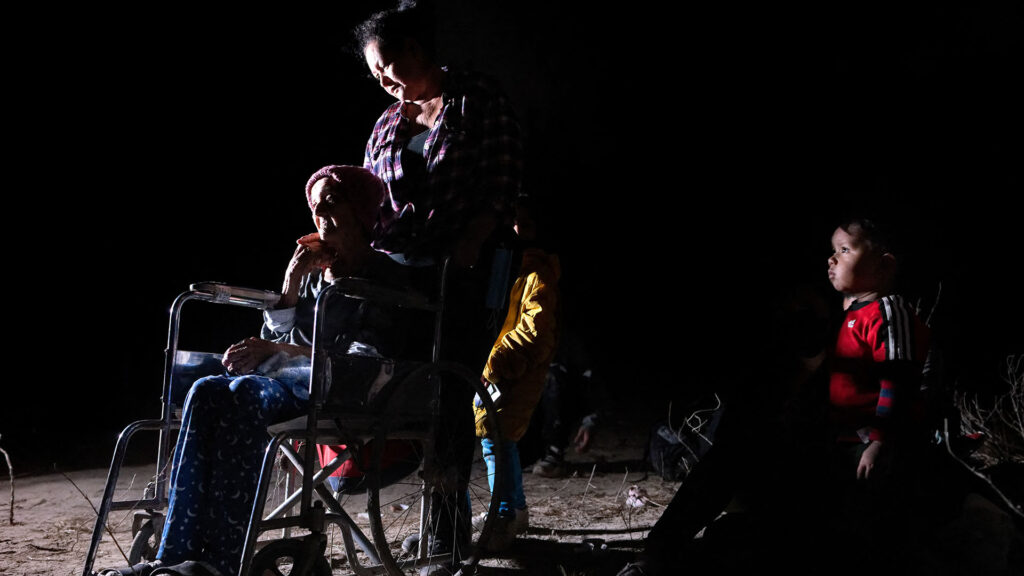Trinidad Tábora accompanied her granddaughter and great-granddaughters, all of whom undertook the dangerous path together with other Central Americans.
In the last two months the flow of Central American migrants crossing Mexico to the United States has intensified, in addition to the concern of the alarming rate of migrant children traveling alone, now a case was seen that contrasted with the release of some images of a grandmother 93-year-old in wheelchairs who also crossed the Rio Grande.

Coming from Honduras and accompanied by her granddaughter and great-granddaughters, Trinidad Tábora undertook the dangerous path together with other Central Americans in search of the American dream and managed to reach Rome, Texas, from Tamaulipas, Mexico.
Advertisement
The photojournalist John Moore managed to capture the images with which he showed the determination of this 93-year-old woman and the solidarity of other migrants who helped carry her on routes where her wheelchair could not travel due to the stones on the road and already at the crossing of the abundant river.
Aided by other migrants, Trinidad crossed the Rio Grande in an inflatable raft and, upon reaching the United States, she raised her hands in gratitude.
On several occasions she was carried in her arms by her granddaughter, while another person was in charge of moving her wheelchair.
Both women seek political asylum in the northern country, so they waited for border agents to be detected, the reason why they decided to risk everything to transit through Mexico was not disclosed, where hundreds of migrants have been extorted, kidnapped and even killed by local cartels.
Migrants expelled by the US saturate camp in Mexico
About 400 migrants who were expelled by the United States have camped in a plaza in Reynosa, a dangerous border city in Mexico, Doctors Without Borders reported Thursday.
The humanitarian organization said some of the migrants have disappeared and others are living in miserable conditions in the Plaza de Reynosa, in Tamaulipas state, which is riddled with drug cartels.
The square is near a border bridge where most of the migrants were expelled under a policy related to the coronavirus pandemic known as “Title 42”. Many sleep in a small kiosk located in the square, without water supply or medical care, the group said.
“We have reports of people disappearing day and night in the plaza, which is very worrying,” said José Antonio Silva, the MSF coordinator in Reynosa.
The organization said the number of returned or deported migrants is increasing, and that the makeshift camp could be turned into a longer-lasting camp, like the one in the neighboring city of Matamoros that was dismantled a few months ago.
Mexico has not established a sufficient number of shelters to serve migrants, the group added.
Title 42 is a section of a public health law that the administration of former US President Donald Trump invoked a year ago. Migrants are expelled to Mexico in accordance with the norm implemented by the pandemic, which denies them the opportunity to request humanitarian protections.
President Joe Biden has kept the policy in place as he designs what he promises to be a “human asylum system.” Citizens of Mexico, Guatemala, Honduras and El Salvador are generally returned to Mexican territory, while people of other nationalities are detained in the United States to be sent to their countries of origin by plane without having the opportunity to request asylum.
Reynosa, a city of 700,000, is where many migrants are driven from Rio Grande Valley, Texas, which is the busiest corridor for illegal crossings. The Border Patrol has said that the vast majority of migrants are expelled to Mexico after spending less than two hours in the United States to limit the spread of the coronavirus, meaning that many arrive in Reynosa after dark.
Under normal circumstances, bilateral agreements state that deportations must take place during the day and at the largest crossings. But under the policy implemented in the pandemic, Mexicans, Guatemalans, Salvadorans and Hondurans can be expelled to Mexico overnight and sent to small towns.
Tamaulipas is one of five Mexican states that the United States Department of State recommends against visiting. A travel advisory issued by the United States indicates that heavily armed criminal groups travel through Reynosa in vehicles with and without markings.




